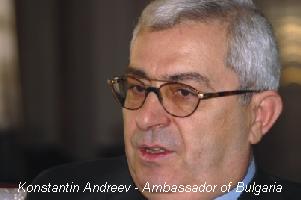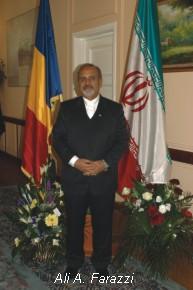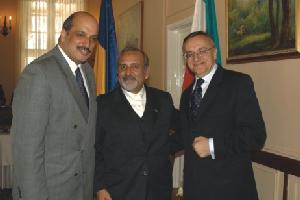Ireland rolls into town
 The Celtic state has just announced that it will open a new embassy in Romania this summer
The Celtic state has just announced that it will open a new embassy in Romania this summer
“You always find the Irish everywhere you go,” says Irish consul Barry Mulligan, “we're very adaptable.”
Mulligan estimates that around one to two hundred fellow Irish have wound up living in Romania and, since 1990, around 5,000 charity workers have passed through the country.
Many of these are entrepreneurs who have set up small companies such as software firm Quidico, or Mulligan's own Mercury Promotions. Meanwhile Ireland's signature brands, such as Jameson's whisky and Guinness, have long sold out to multinationals, so do not constitute as a direct investment.
“Business is usually pretty small stuff,” he says. But property is offering the biggest potential. “The Irish are the biggest developers in Budapest now and they are looking to Romania, in every sector from hotels to land.”
Mivan Kier, a construction firm from Northern Ireland recently won the contract to build an 11 million GBP water supply project from the Romanian Government, including providing a portable water route to villages that previously only had wells, to be completed by December 2006. For four years, the firm has set up 60 other water supply schemes and constructed social housing in the country.
First arriving to help establish the Coca Cola brand in Romania in 1993, Mulligan has since set up his own marketing company, although he now takes a backseat to this business. He also organises the annual St Patrick's Day celebration, this year on 16 March at the Romanian Atheneum.
As if this was not enough, his other jobs includes making visits to Irish who get locked up in Romanian prisons, usually for drug possession, processing visas for Romanians who want to enter Ireland, as well as dealing with lost passports. However it is rare that the Irish residents call on his services.
“Irish people don't register at consulates,” he says, “it's not part of our make-up.”
Films are also attracting Irish talent to Romania. Mulligan has helped write, produce and act in yet-to-be-distributed What Means Motley?, charting a group of Romanians who pose as musicians in order to gain access to Ireland, and has co-produced a Canadian film about international adoptions, 'Return to Sender'.
Going south of the border
 Political problems rarely occur between Romanians and Bulgarians, but a restrictive visa regulation and only one bridge between the two nations prevent them from having many chances to meet.
Political problems rarely occur between Romanians and Bulgarians, but a restrictive visa regulation and only one bridge between the two nations prevent them from having many chances to meet.
Few would doubt that Bulgaria has been a better student of the European accession process than Romania.
It completed its criteria months ahead of Romania and, although recently a botched privatization of its state cigarette firm triggered a minor political hiccup, the last four years have seen economic reforms that its Danube neighbour must truly envy.
But now the two nations are currently in discussions to take a joint development project to Brussels. “We have to be partners,” says Ambassador Konstantin Andreev. “We don't need to compete. There is all this talk about the Balkan countries and the mistrust we have for each other, but frankly that is rubbish.”
Bulgaria's GDP is increasing by around six per cent per year, less than Romania's reported rate, and it still has to cope with around 12 per cent unemployed, but per capita, its FDI outstrips its EU and NATO partner.
Bulgaria forecasts a year-end FDI of 1.6 billion Euro for its 7.8 million population (205 Euro per head) in 2004, compared to 2.25 billion for Romania (107 Euro per head), with 21 million people.
However, while the two nations are vying for interest from foreign investors, their own inter-country trade has not been impressive.
In 1995 the bilateral trade volume was 150 million USD and has since risen to 600 million USD in the first 11 months of 2004, compared to around two billion between Hungary and Romania.
“Ten years ago the trade was insignificant,” says Andreev. “We were both more concerned with building up our diplomatic institutions and legal environment. After this, commerce began to restore to its previous levels.”
But he adds that Bulgarian companies in Romania are “a bit more active” than Romanian companies in Bulgaria. His nation's FDI in Romania amounts to about 11.1 million USD (compared to 350 million USD from Hungary), but Romania's in Bulgaria is insufficient, and is mostly the expenditure on maintaining an office in Sofia. Logistics is the real problem. Where the two countries are divided by the Danube, there is only one bridge, between Ruse and Giurgiu. Otherwise individuals or businesses are forced to take the ferry and, when 30 per cent of the Danube is iced over, which has been the case this winter, ships cannot run.
Firms and individuals also face huge taxes on their vehicles for passing over the bridge, introduced by the local Giurgiu administration, which can rise to around 70 USD.
There is also a social cost. “The lack of crossings means a lack of human contact,” he adds. Romanians and Bulgarians are not well informed about each others' cultures. “I was brought up near the border in Ruse, and I haven't noticed Romanians hurrying with enthusiasm to visit Bulgaria, or vice versa.”
In May 2003 the Romanian Government changed its visa system, ending compulsory visas for citizens of the new EU countries staying in the country for business reasons, but did not include Bulgaria. This, the Ambassador argues, puts his country in an unequal position and impedes development of economic relations.
However, he believes that these problems will be solved. They will need to be as, by 2009, when the Schengenagreement will hopefully come into effect, Romanians will be able to walk over an iced-up Danube without a passport.
Andreev argues the two nations should not wait. If the Visa and bridge toll were dropped, this would be an incentive to
further cross-border trade, which could compensate the loss in earnings for the local authorities. One has to only witness the financial benefits that have been reaped by Arad's proximity to Hungary, which could be replicated, to a lesser degree, in Romania's south.
In Spring this year the construction of a bridge between Vidin, Bulgaria and Calafat, Romania will start, creating the Transeuropean corridor number four and hopefully helping commerce.
Mostly in agriculture, petroleum and manufacture, 583 Romanian-Bulgarian firms are registered locally, the largest if which is oil and oil products firm Prista Oil and others include Shelf Gas, Danubius EXIM, Ficosota Syntez Romania and GAZEXIM Grup.
Since entering Romania in 1998 Prista Oil has built up a share capital of almost 800,000 USD and now has a market share of 12 to 14 per cent in car lubricants and car batteries. Expansion plans include developing a network of fast car service outlets, Tituz Olteanu, commercial manager with Prista Oil Romania told The Diplomat. The recent privatization of Petrom means the lubricants market in Romania will suffer a shake-up, which could allow new opportunities for companies such as Prista.
Historic partner aims to cement ties
 On the 26th anniversary of its republic, Iran maps out its intentions for boosting trade
On the 26th anniversary of its republic, Iran maps out its intentions for boosting trade
Iran hopes to improve ties in business, particularly in recuperating its former status with Romania as an industrial partner in cement, machinery and in reconstruction.
“If Romania is going to join the EU, it must not forget its old friends, the markets from the Middle East and Asia,” says the Iranian Ambassador Ali A Farazi, who considers that if the Balkan country works at maintaining its pre-Communist market connections, it will have more currency within the EU.
“The bilateral trade after Communism decreased by more than 90 per cent between Romania and Iran, from one billion USD per year before 1989 to only 76 million USD last year,” he says.
One of the most important trade contracts signed in 2004 by Romania with Iran was the 45 million USD worth of train wagons from the Romanian Romarc company.
There are also other ways that could increase bilateral relations, besides trade, argues the embassy. The Ambassador sees good opportunities for a joint business venture with Romanian companies in Central Asia, the Persian Gulf and in Afghanistan.
“In cement, Romania has very good experience, like Iran and now, after the end of the war, in Afghanistan, Iraq and Central Asia. This is the time to start reconstruction and many factories could have good activity in that area, which is a good market,” says Farazi.
“Before 1989, the trade between the two countries was very easy, because there was a connection between the two governments,” he adds.
After the revolution and the opening of the borders to the west, everything changed.
“Now Romania is present on the free market, and so are we, which means we are not necessarily going to sell our oil directly to Romania, but to the free market,” adds the Iranian Ambassador, “therefore, one cannot blame anyone for the decrease in bilateral trade relations. We should be realistic as that is the nature of today.”
A slight increase in trade was registered consecutively from 2001 until last year, but things can be improved. This April the Iranian Ambassador will organize special private forums for the investment, banking system, insurance and other large companies. There will also be a joint meeting of the Iranian and Romanian chambers of commerce.

In June Iran is going to participate in consumer goods fair TIBCO 2005 with the Iranian president for Export Development, who is also deputy Trade Minister. Iran was last year's winner of the first medal at this fair, because of the large number of its participating companies, says the embassy.
“Before 1989, Iran used to import a lot of Romanian tractors, which still have a good name among villagers,” says Farazi, adding that the cooperation in this business is not as large as before, since it is now more focused on importing railroad equipment and train wagons.
Iran has recently started privatisation processes for its state owned companies. Last year the first private Iranian banks opened. The steel and oil companies have not yet been privatised, but the legal environment for the privatisation was set two years ago, when the Iranian parliament passed the law of securing foreign investments in Iran. The country also offers special facilities for free trade areas in Keish, Gheshm and Chabahar.
“After 23 years of diplomacy, I always tell my colleagues here that I am very happy I chose Bucharest,” says the Iranian Ambassador, who has been in the country since October 2003. “Romania is living a very important period of its life. This moment will remain in the history as its golden years.”
After many years of being under the Communist dictatorship, the Ambassador says: “Romania has tested their freedom in the economic, social and cultural lives and now they have more capacity to go ahead and, for a diplomat, these are all very good and important points that we can study and focus on.”
From a social point of view, the Ambassador believes that although the Romanian people are geographically Europeans, their culture and soul are more oriented towards Iran. “For example, in Romania I found that the family has very strong roots, and Romanians pay special attention to the family (grandpa, grandma and children), to traditions, although they are Europeans; in this respect it is like life in the Orient.”